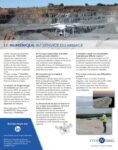The defense sector is witnessing a significant breakthrough with the unveiling of the Kaplan, a revolutionary troop transport vehicle.
Born from a close collaboration between FNSS from Istanbul and PT Pindad from Indonesia, this vehicle promises to redefine industry standards.
Presented at the Saha Expo arms exhibition last October, the Kaplan is already generating significant interest.
Designed for all-terrain and all-weather operations, the Kaplan is equipped with an advanced suspension system that reduces internal vibrations and improves traction. Its electronic infrastructure in open architecture enables the seamless integration of new technologies, thus ensuring increased flexibility. The vehicle can accommodate up to 13 occupants, including a crew consisting of a driver, a gunner, and a commander. With a maximum speed of over 70 kilometers per hour, the Kaplan is one of the fastest vehicles in its category. To ensure the survivability of the crew, it features an automatic fire suppression system, CBRN defense, and climate control in a sealed internal environment. Its modular design allows the integration of manned or unmanned turret systems, capable of mounting various calibers of weapons, including 30 mm and 35 mm cannons, 120 mm mortars, and guided anti-tank missiles.

Table des matières
ToggleIntroduction of the new Kaplan troop transport
The collaboration between Turkey and Indonesia in armaments reaches a new milestone with the development of the Kaplan troop transport. This joint project, led by the local armored vehicle manufacturer FNSS and the Indonesian company Pindad, reflects a strengthened synergy between the two nations to meet the growing needs of the Indonesian army. Unveiled during the Saha Expo, an international arms fair, last October in Istanbul, the Kaplan is presented as a versatile and robust vehicle, designed to operate effectively in various terrains and climatic conditions.
The production of the Kaplan will begin in 2025, with the first unit manufactured at FNSS facilities in Turkey, followed by the second at PT Pindad in Indonesia. This distribution of production highlights the importance of local collaboration and the transfer of skills between the two companies. Deliveries are planned for the end of 2026, depending on the specific needs of the Indonesian army, thus ensuring optimal vehicle adaptation to terrain requirements.
Leaders from FNSS and PT Pindad emphasized during the unveiling ceremony that the Kaplan represents a significant advancement in armored vehicle technology, thanks to its advanced features and modular design. This project is part of a broader strategy aimed at enhancing partner defense capabilities and promoting technological innovation in the military sector. By working closely together, Turkey and Indonesia demonstrate their joint commitment to developing modern and effective defense solutions.
Objectives and issues of the Turkish-Indonesian collaboration
The collaboration between Turkey and Indonesia in developing the Kaplan troop transport aims at several strategic objectives. First, it enables both countries to pool their expertise and resources to design a vehicle tailored to the specific needs of the Indonesian army. By combining FNSS’s experience in armored vehicles and Pindad’s deep knowledge of the Indonesian market, this partnership promises an effective and customized solution.
Another significant issue of this collaboration is the strengthening of bilateral relations between Turkey and Indonesia in the defense sector. By partnering on large-scale projects like the Kaplan, the two nations enhance their position on the international scene and pave the way for future cooperation in other technological and military fields. This strategic alliance also contributes to diversifying sources of supply for military equipment, thereby reducing dependence on traditional actors.
Moreover, this project represents an important economic opportunity for both countries. The shared production of the Kaplan creates local jobs and stimulates the defense industry in both nations. By facilitating technology transfer and the development of local skills, this collaboration contributes to technological autonomy and sustainable economic growth. Additionally, it serves as a model for other international partnerships, demonstrating that close cooperation can lead to significant innovations beneficial for all parties involved.
Finally, the Turkish-Indonesian collaboration takes place against a global geopolitical backdrop where the modernization of armed forces is crucial. In the face of growing security challenges, the creation of high-performance armored vehicles like the Kaplan is essential to ensure the protection and efficiency of troops on the ground. By investing in advanced technologies, both countries are preparing to respond effectively to current and future threats, while contributing to regional stability.
Technical characteristics of the Kaplan
The Kaplan troop transport stands out with its numerous advanced technical features, designed to offer optimal performance in various operational environments. Designed for all-terrain and all-weather use, the Kaplan is equipped with a sophisticated suspension system that reduces internal vibrations and improves traction, thus ensuring stable and comfortable driving even on the most difficult terrains.
The interior of the Kaplan can accommodate up to 13 occupants, including a crew consisting of a driver, a shooter, and a commander. This capacity makes it an ideal vehicle for the rapid and secure transport of troops on the battlefield. Additionally, the Kaplan integrates an open architecture electronic infrastructure, allowing for the future integration of new technologies and advanced systems, ensuring its longevity and adaptability in the face of technological developments.
In terms of mobility, the Kaplan is one of the fastest vehicles in its category, capable of reaching speeds of over 70 kilometers per hour. This speed allows for efficient tactical movements and increased responsiveness on the ground. Furthermore, the vehicle is equipped with an automatic fire suppression system, CBRN defense, and climate control, thus ensuring the survival of the crew in hostile environments.
The Kaplan is also distinguished by its modular design, offering the possibility to integrate different weapon systems. It can be fitted with manned or remotely operated turrets, supporting a variety of calibers such as 30 mm and 35 mm machine guns, 120 mm mortars, and guided anti-tank missiles. This modularity allows the Kaplan to easily adapt to specific missions and operational requirements, making it a valuable asset for the Indonesian army.
Timeline and production stages
The development of the Kaplan troop transport follows a well-defined timeline, aimed at ensuring a smooth production process that meets the expectations of the Indonesian armed forces. After the revelation of the concept at the Saha Expo last October, preparations for production were immediately set in motion. The first phase of manufacturing will begin in 2025 at FNSS’s factories in Turkey, where the first units will be assembled using the cutting-edge technologies developed specifically for this project.
Once the first units are produced in Turkey, production will gradually shift to PT Pindad’s facilities in Indonesia. This transfer of production is crucial for strengthening local industrial capacities and promoting indigenous expertise in the manufacture of armored vehicles. This step will also create jobs and stimulate the local economy, while ensuring better adaptation of the Kaplan to the specific needs of Indonesian terrain.
Both companies will conduct rigorous qualification tests in their respective countries to ensure that the Kaplan meets the required performance and quality standards. These tests will include real-condition trials, assessing the vehicle’s mobility, durability, and reliability in various operational environments. Only the units that pass these preliminary tests will be approved for series production and delivery to the Indonesian armed forces.
The final production phase is planned to conclude by the end of 2026, with staggered deliveries based on the specific needs of the army. This approach allows for a gradual and controlled distribution of the vehicles, thus ensuring a seamless integration of the Kaplan into existing units. Additionally, ongoing maintenance and technical support will be provided by FNSS and PT Pindad, ensuring the durability and efficiency of the Kaplan throughout its lifecycle.
Impact on the Indonesian armed forces
The introduction of the Kaplan into the ranks of the Indonesian army represents a significant advancement in terms of operational capabilities and modernization of ground forces. This versatile armored vehicle allows for the rapid and secure deployment of troops, thus improving the mobility and responsiveness of units on the ground. By providing enhanced protection against conventional and unconventional threats, the Kaplan contributes to the security and effectiveness of military missions.
With its modular design, the Kaplan can be equipped with various weapon systems, thus offering tactical flexibility according to the requirements of each mission. This adaptability allows the Indonesian armed forces to quickly adjust to the evolving battlefield, integrating new technologies and responding to emerging threats. Furthermore, the capacity to accommodate 13 occupants enhances troop coordination and optimal management of human resources in the field.
The advanced suspension system of the Kaplan significantly reduces internal vibrations, thus providing increased comfort for the crew during movements over difficult terrains. This feature enhances the troops’ ability to remain operational and focused, even in prolonged combat conditions. Additionally, features such as automatic fire suppression and CBRN defense ensure maximum protection for the crew, strengthening the resilience of Indonesian forces against modern dangers.
By integrating the Kaplan into their ranks, the Indonesian armed forces also benefit from improved interoperability with Turkish defense systems, thus facilitating collaboration and information sharing among allies. This synergy enhances the collective response capability against regional and international threats, while consolidating strategic ties between Turkey and Indonesia. Moreover, the introduction of modern armored vehicles like the Kaplan plays a crucial role in the training and skill development of soldiers, preparing them to effectively utilize the advanced technologies deployed on the field.
Future perspectives and technological innovations
The development of the Kaplan paves the way for numerous future perspectives and technological innovations in the field of armored vehicles. One of the main ambitions of the Turkish-Indonesian partners is to integrate autonomous systems and cutting-edge technologies to further enhance the operational capabilities of the Kaplan. For example, incorporating artificial intelligence solutions could enable better real-time analysis of terrain conditions and potential threats, thus optimizing tactical decisions on the battlefield.
Furthermore, the Kaplan is designed to be compatible with an open electronic infrastructure, facilitating the future integration of new technologies such as advanced communication systems and surveillance devices. This technological flexibility allows the vehicle to adapt to the rapid changes in the military domain, thus ensuring its relevance and effectiveness in the long term. The partners also plan to collaborate with innovative players in the sector to develop tailored solutions addressing the specific needs of the Indonesian armed forces.
Moreover, the Kaplan project is part of a broader dynamic aimed at linking innovation to complex governmental challenges. Based on analyses and case studies available on specialized platforms like deftech-relier-linnovation-aux-defis-gouvernementaux-complexes/”>DefTech, the teams from FNSS and PT Pindad are incorporating best practices in technological development and project management. This approach enables overcoming technical and logistical obstacles, thus ensuring an effective implementation of the Kaplan project.
In addition, the innovations brought by the Kaplan could serve as a reference for other future projects, both regionally and internationally. By demonstrating the viability and effectiveness of this armored vehicle, the Turkish-Indonesian partners reinforce their position as leaders in the defense sector, attracting the interest of potential new clients and opening doors to new opportunities for collaboration. The technological advancements achieved within the framework of the Kaplan also contribute to the evolution of industrial standards, encouraging the adoption of innovative and sustainable solutions in the military field.
Finally, ongoing commitment to research and development is essential to maintain and enhance the performance of the Kaplan. Investments in emerging technologies and partnerships with academic institutions and research centers will ensure that the Kaplan remains at the forefront of innovation, capable of meeting the future requirements of military operations. By nurturing a culture of innovation and excellence, Turkey and Indonesia ensure that their collaboration in the field of armaments continues to produce advanced and effective solutions for contemporary security challenges.
[#Livraison ✅️] Jumelles de vision nocturne
— Direction générale de l'armement 🇫🇷 (@DGA) October 17, 2024
La DGA a livré 300 jumelles Bi-NYX développées par @ThalesDefence à destination de l'@armeedeterre
Au total, 2000 jumelles seront livrées sur l'année 2024 ⤵️#LPM24_30 pic.twitter.com/UNSSbyUlNq
























